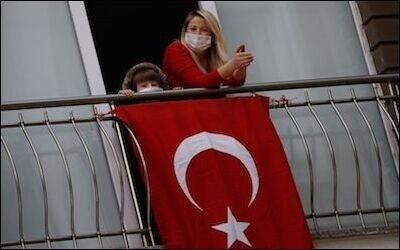Public support for Turkish President Recep Tayyip Erdoğan appears to be rising as the COVID-19 death toll mounts. |
... [T]he coronavirus pandemic has the potential to give [Turkish President Recep Tayyip] Erdoğan a political boost, although the next presidential and parliamentary elections are three years away. Who else would the Turks turn to in these difficult days of quarantine and curfew?
Erdoğan recently suspended parliament for 45 days, citing a national campaign to fight the coronavirus pandemic. But he did that only after passing bills he had sponsored.
Kemal Kılıçdaroğlu, leader of the main opposition Republican People’s Party (CHP), accused Erdoğan of abusing the coronavirus crisis to tamper with the legislative authority. “The suspension of parliamentary sessions is the result of Erdoğan’s one-man rule,” he said. “Erdoğan is mistaken if he thinks he can unilaterally resolve any problem or any crisis.”
The Turkish people tend to embrace strong leaders in the face of national threats. |
One of the laws Turkey’s rubber-stamp parliament passed before the recess allowed the release of tens of thousands of common criminals, to ease overcrowding in jails and protect inmates from the pandemic. The amnesty, however, excluded hundreds of political prisoners including journalists, writers, academics and social media users critical of Erdoğan’s authoritarian regime.
In 2015, Turks had a collective scare from terrorists and their bombs. In 2016, they feared their military officers who fired on civilians and bombed the parliament building. In 2020, the collective fear is the coronavirus pandemic. And just as in the previous instances based on fear, it seems to be working to Erdoğan’s advantage.
Collective fear seems to be working to Erdoğan’s advantage. |
Metropoll, a non-partisan pollster with no ties to the AKP, found that Erdoğan’s approval rating rose from 41.1% in February (when no coronavirus cases had been detected in Turkey) to 55.8% in March (when the virus started to spread in Turkey). According to Metropoll’s findings, Erdoğan’s coronavirus crisis management was approved by 19.6% of (main opposition) CHP voters. Before the coronavirus, only 4.3% of CHP supporters had a favorable opinion of Erdoğan. In March, Erdoğan’s approval rating from the opposition bloc was an impressive 25.8% from voters of the pro-Kurdish People’s Democratic Party; 23.8% from the center-right IYI Party; and 64.7% from the Islamist Felicity Party.
Özer Sencar, president of Metropoll, explains that with a general tendency to trust Erdoğan’s crisis management, “The people tend to unite behind strong leaders in times of national crisis like war, terror, security threats, disasters or pandemic.”
Burak Bekdil is an Ankara-based political analyst and a fellow at the Middle East Forum.







